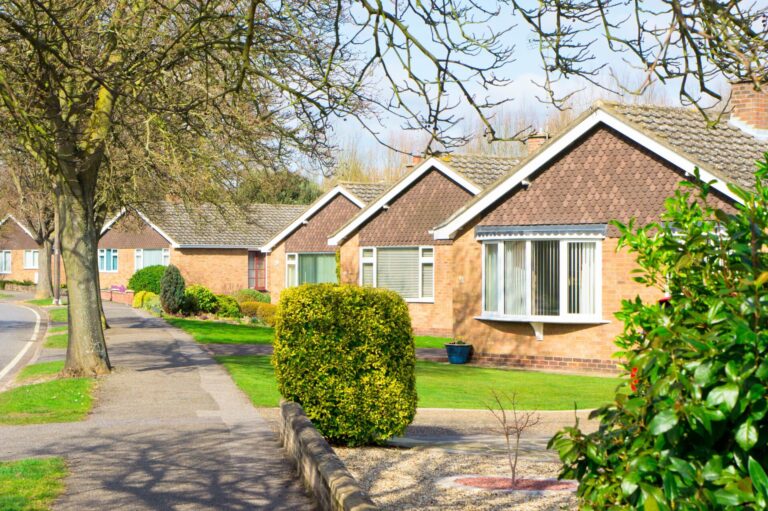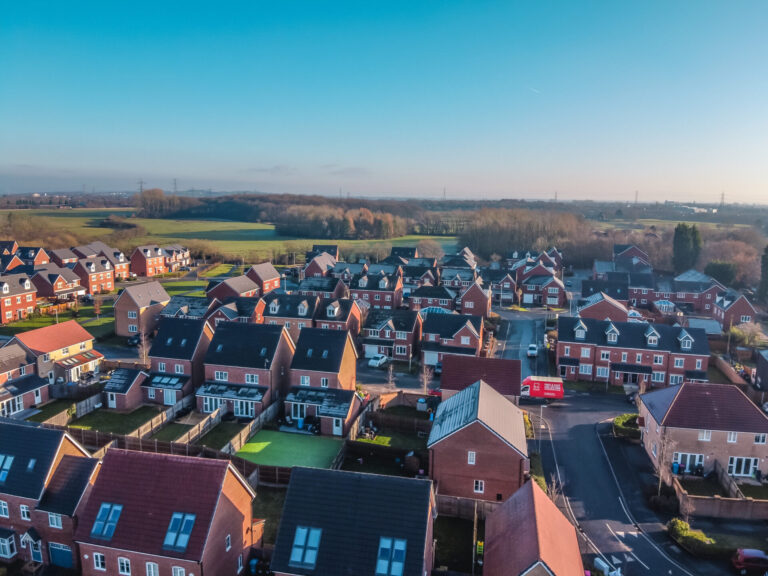If you’re struggling to get on the property ladder, shared ownership could be the answer you’re looking for. This government-backed scheme is designed to help people afford their first home, and (crucially) to enable them to buy one that’s big enough for their household.
Our shared ownership guide provides all the information you need to decide if buying a property through shared ownership is right for you.
What is shared ownership?
Shared ownership is a scheme in England that allows people to buy a share of a property. Some people refer to the scheme as “part rent, part buy” because you have to pay rent on the portion of the property that you don’t own. The rest of the property share is owned by the housing provider or landlord, and this is who you’ll pay rent to.
The size of property share you can buy is generally between 25% and 75% of its market value. However, it’s possible to buy as little as a 10% share on some homes.
Shared ownership works because it brings property ownership within reach for people on lower incomes. This is because both the deposit and the mortgage payments needed are smaller than they would be when buying a whole property on the open market.
Over time, you can build up your shares in the property so that you can own it outright. By purchasing more shares, you’ll own more of the property and pay less rent; this approach is sometimes referred to as staircasing.
Shared ownership houses and flats are provided by housing associations, local councils and other organisations.
Eligibility for shared ownership
The shared ownership scheme runs in England, but there are alternative schemes available in Northern Ireland, Scotland and Wales.
To be eligible for shared ownership, you must meet several criteria:
- You must be at least 18 years old
- Your household income must be £80,000 or less per year (or £90,000 or less when buying shared houses in London)
- You need to prove that you can’t afford to buy a whole property that’s the right size for your needs
- You can’t own another property (or if you do, you need to prove that it’s sold subject to contract. This sale must complete before you complete on your new shared ownership home)
- You’re can’t be in rent or mortgage arrears
- You need to have a good credit score – your credit history will be looked at to see if you’re a risk for the lender
Calculating costs
When thinking about buying a shared ownership house or flat, it’s important to be aware of all the costs involved so you know you can afford it.
The shared ownership monthly costs you’ll have to cover include:
- Mortgage repayments on your share of the property
- Rent payments on the share that you don’t own
- Property service charges (these may cover the cleaning and maintenance of communal areas, like communal gardens)
Ongoing costs
You’ll have to pay for all the repair and maintenance costs for your property. This is true even if you own a relatively small amount, like 10%. However, your landlord may provide an initial repair period (which is normally ten years) to cover some of the costs. Information about this will be in your key information document.
During the initial repair period, you can claim up to £500 a year for issues with the supply of water, gas or electricity, and for problems with heating your home (such as boiler issues). However, you can’t claim for costs like fitting appliances (such as ovens) or for installing fixtures (like cabinets etc.)
You can decorate your home however you like, but if you want to make any structural changes to it, you may need written permission from your landlord.
Structural repairs
Building warranties normally cover any structural and external repairs for new build properties during the first ten years.
Flat owner landlords may charge a reserve fund (otherwise called a sinking fund) to cover any major structural works that need to be undertaken. If you don’t pay into a fund like this, the building owner will split the costs of any external and structural repairs between you and any other flat owners in the building.
Ground rent
Costs used to include ground rent, which was paid annually (and leases granted before 30th June 2022 may still include it). However, since the Leasehold Reform (Ground Rent) Act 2022, you can’t be charged more than a “peppercorn” ground rent, and the value of this is effectively zero.
Buying costs
The process of buying your share of a property creates further costs for you:
- A deposit – this is normally 5%-10% of the value of the share you’re buying
- Solicitor’s fees
- You might have pay stamp duty
- When you find the home you want, you may need to pay a reservation fee. This could be up to £500, which will be taken off your costs when the sale completes. However, you won’t get this money back if you don’t end up buying the home.
If you want to discuss the costs of buying a home our expert agents are ready to help you, so contact your local Hunters branch now.
Affording a shared ownership home
Before going ahead with shared ownership, you should go through your finances thoroughly to make sure you can afford it. This will also indicate how much of a share you can buy, and how much of a deposit you can afford.
Assessing your financial situation
Work out your household income (after tax) so you know how much money you have coming in every month. Then consider any debts you still have to pay (such as credit cards), and work out how much you’ll spend tackling these each month.
Look up your credit score, and see if there’s anything you can do to improve it. If you have credit cards you don’t use, then close these accounts and keep up with repayments on any other cards you have.
If you’ve never had a credit card or a bank loan this can give you a negative credit rating too. Take out a credit card and then pay off the balance in full every month. This shows that you can handle money well (i.e. you can borrow money and repay it) and this will give you a better credit score.
Tips for first-time buyers to afford to buy
When planning to buy your first home, it’s really helpful to have some savings to cover the multiple costs involved. Spend some time setting money aside when you can.
Buying your first home can feel daunting, and the best way to move forward is to gather as much information as you can. Talk to a mortgage advisor about your options. They’ll assess your financial situation and give you a clear idea about how much you can borrow.
Once you know what you can afford, you can start looking at the areas you can afford to buy in. Whilst you’re doing this, start preparing your paperwork by getting your ID ready and saving copies of your utility bills etc.
Affordability calculations and budgeting
It’s important to be sure that shared ownership is affordable for you. Work out how much money you’ll have left from your household income after your mortgage payment, rent and service charges go out each month. Many lenders suggest that the total costs of these monthly payments shouldn’t be more than 45% of your income.
Next, you need to budget for all your other monthly costs, such as energy bills, food and phone bills etc. Make a list of all your outgoing costs and work out how much this comes to each month to see what you’re left with. Make a monthly budget and stick to it, so you know that it can work for you going forwards.
Selling your shared ownership property
When it comes to selling your property, if you own 100% of the shares you may be able to sell it on the open market. However, it’s worth checking your agreement as you might still need to give formal notice to the housing association.
The selling process for shared ownership homes
If you own part of your home, you’ll need to give notice to the property owner by telling them that you intend to sell. This gives them some time to find a buyer for your share of the home.
The amount of time they have to do this will be set out in your lease (it could be 4, 8 or 12 weeks). If the landlord doesn’t find a buyer within this time, you can then sell your share of the property on the open market.
Valuation and market price considerations
You’ll need to get a property valuation done by a surveyor that’s registered with the Royal Institute of Chartered Surveyors (RICS). This valuation will decide the sale price of your home. Your landlord may arrange the valuation (check your agreement) but you’ll still have to pay for it.
Legal requirements for selling
When you’ve had your valuation done and you decide you definitely want to sell your share of the property, you’ll need to complete a contract of sale. You’ll also need to instruct a solicitor to manage your sale, as you need to put their contact details in the contract.
This is also the stage that you should get an Energy Performance Certificate (EPC) as it’s a legal requirement to have this in place within 28 days of marketing your property.
FAQs on Shared Ownership
What is the minimum and maximum share I can buy?
The minimum share of a property you can buy is usually 25%, and the maximum is 75%. However, you can buy as little as 10% of some homes.
Can I buy additional shares in the property later?
After you become the owner, you can buy more shares later, and this is called staircasing. You’ll need to check your lease to find out when you can buy additional shares, and how much you can buy at a time.
What is staircasing in shared ownership?
Staircasing is the name for buying more shares in your property. As you buy more shares, you own a higher percentage of the home, and you pay less rent on it. It’s a good way to gradually build the amount you own, and you can build all the way up to owning 100% of your property.
How do I apply for a shared ownership property?
You need to check that you’re eligible for shared ownership, then find the home you want to buy (through housing associations, local councils or other organisations). You can then reserve your home. You’ll need a solicitor to handle the legal side of things, and to check the terms of your shared ownership.
What are the income requirements for shared ownership?
Your household income must be £80,000 or less, or £90,000 or less in London.
How much deposit do I need for a shared ownership home?
You’ll normally need a deposit that’s the equivalent of 5% or 10% of the share you’re buying. However, it can be different depending on the property and where it is, so it’s worth checking some listings of the homes you’re interested in.
How are monthly costs calculated in shared ownership?
You’ll have your monthly mortgage repayments, which will be defined by the terms of your mortgage, but you’ll also pay rent. Rent is paid on the share of the property owned by the landlord, and this is generally around 3% of the share price per year (divided into monthly payments). On top of this you may have monthly service charges.
Does shared ownership mean living with someone else?
No; many people think so, but this isn’t the case. You’re sharing ownership of a property with the housing provider; you’ll own a share, and you’ll pay rent on the rent on the landlord’s share.
If you’re considering buying a home, contact your local Hunters branch now.




